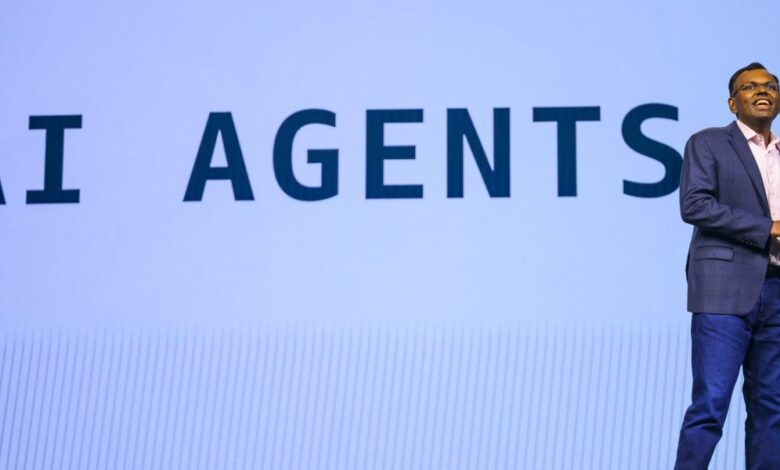Amazon’s AWS has joined the AI agent craze. Now the real work of showing Fortune 500 companies how to actually use them begins


Amazon Web Services joined the agentic AI frenzy in a big way this week, revealing at a New York City event Wednesday a host of services and tools dubbed Agentcore that let technologists build and deploy so-called AI agents capable of automating internal tasks while potentially overhauling the way consumers interact with online businesses too.
These agents, to many in the tech industry, are the next evolution in our new AI-powered future, where artificial intelligence not only acts as an assistant, but can autonomously complete complex multi-step actions with just some human intervention in sensitive sectors like healthcare, and no human intervention in lower-risk areas.
But at least in the short term, the real battle between AWS and agentic AI competitors may depend less on technology differentiation, and more on who employs the most quality talent to help guide large corporations on where to even begin with AI agents.
Businesses “are frustrated because they want someone to tell them what to do and how to do it,” Dave Nicholson, chief technology advisor at The Futurum Group, told Fortune. “There isn’t enough [talent] to go around. Humans are the bottleneck.”
Nicholson added that AWS and other cloud and large tech companies will need to heavily lean on partner companies to assist with customer education and implementation too.
The business case for agents was pushed into the forefront last year by Salesforce, with the announcement of a new division it calls Agentforce. Google, OpenAI and other cloud and technology players have since rushed to announce AI agent tools and services geared toward corporations. On Thursday, a day after AWS’s showed off its agent tools, OpenAI announced a new, general purpose agent for users of its ChatGPT product.
Fear of missing out
With just about every CEO these days under pressure to craft an AI strategy, the incoming AI agents may be poised to capitalize on the situation.
In an interview with Fortune after his keynote presentation announcing a new in-house collection of agent-building services dubbed AgentCore as well as a marketplace for agents, AWS VP of agentic AI, Swami Sivasubramanian said that Fortune 500 execs whose companies don’t start experimenting with the technology risk missing out on a transformational moment as pivotal as the creation of the internet.
“Agents are fundamentally going to change how we work and how we live,” Sivasubramanian said when asked how execs at Fortune 500 companies can be sure that their investments in building or deploying AI agents isn’t supplanted by a new shiny technology of the moment next year. The executive provided an example of how AI technologies will make it feasible for an agent to, for example, not only plan an itinerary for a trip, but do all of the bookings too.
“You can give it a high level objective, like, ‘Hey, create me a 10 day itinerary in December to visit Australia,’” he said. “It actually understands the objective. Breaks it down into…I need a flight, I need activities to go see in these cities, and then, based on my preferences, it creates a customized itinerary, and actually also secures reservations by calling APIs.”
That’s the type of personal, tangible, example that gives this AWS executive and other proponents of AI agents, the belief that many customer experiences can be overhauled, or created from scratch, with this technology — in ways that might even be hard to envision now.
Agentic rolemodels needed
Slick as some of these scenarios may sound however, the reality is that there are currently few examples of corporations using agents at massive scale. The green field of opportunity is sure to be attractive for some, but it’s also a big challenge for the companies selling agentic products and tools since there are not many real-world examples to guide or inspire.
Amazon Web Services’ market leadership in cloud computing should serve as some advantage, providing a large existing customer base to sell to. And because those companies’ operations are already dependent on AWS, they have more patience for any bumps Amazon experiences as it refines its AI agent business.
“They’re more likely to get two or three strikes,” Nicholson said of AWS and its AI agent rollout.
But it’s an open question whether AWS’ initial focus on heavily marketing its new agentic tools to software developers versus the executives with the purse strings will prove problematic.
“They have disjointed messaging,” Mark Beccue, an analyst at the research firm Omdia, told TechTarget. “When talking about agents, you must have the complete story.”
AWS’ Sivasubramanian said that most C-suite customers that he meets with naturally look inward to how their own organization runs when considering where and how to deploy AI agents first to help automate, or reduce the time to complete, boring, repetitive tasks.
This, of course, raises the question of when and how AI agents will disrupt or displace jobs and in which areas. Amazon CEO Andy Jassy recently weighed in on the overall AI boom in an employee memo, saying that while these technologies will both eliminate current roles while creating new ones, “we expect that this will reduce our total corporate workforce [over the next few years] as we get efficiency gains from using AI extensively across the company.” On Thursday, a day after AWS’ agent-focused summit, the company carried out layoffs of at least hundreds of employees.
A day earlier, Sivasubramanian, perhaps not surprisingly, struck an optimistic tone when discussing a new world full of AI agents that now Amazon — and many rivals — are rushing to bring to fruition.
“Yes, in the short term, if you look at [past] transformations, there were actually changes on the specific job categories [in which people worked], “but then we as humans have really adapted to these changes and then started working on different things. You don’t find people who are doing Y2K engineering anymore.”
“This is the highest level of ‘fear of missing out’ ever among behemoths in the IT industry right now,” Nicholson said. “These are existential decisions being made at Microsoft, Google, and Amazon.”
Source link




